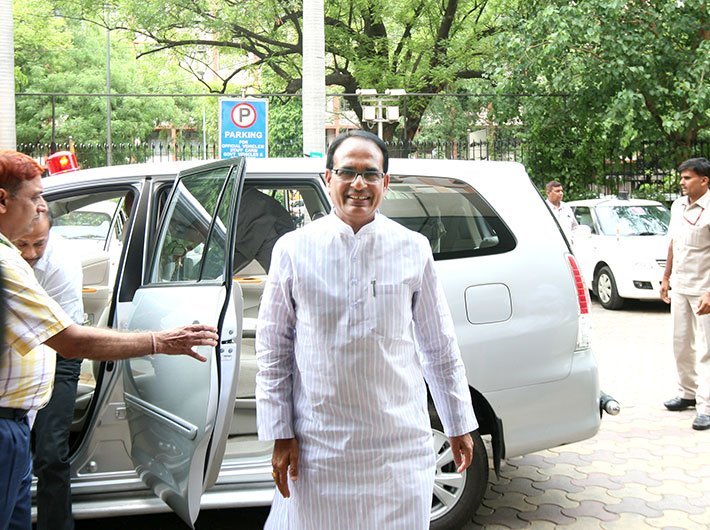In Gwalior, jobs are scarce and the closure of sugar mills has caused deep social unrest among farmers
Madhya Pradesh chief minister Shivraj Singh Chouhan is in the reckoning for a record fourth term in office. In the middle of his hectic campaigning, it will do him good to snatch a few hours of rest to watch Saudagar, a 1973 Bollywood movie starring Amitabh Bachchan.
Saudagar is a great story around the issue of making jaggery. A widow, played by Nutan, is skilled in making jaggery from the juice of palm date. The protagonist (Amitabh Bachchan) marries her only for that skill and dumps her after acquiring wealth. He then marries a young girl (Padma Khanna). Since the latter does not know how to make jaggery, our protagonist finds few takers for his jaggery and starts losing his fortune. The complexity of human emotions, rural economy and society is beautifully portrayed in the movie.
In the Gwalior region of Madhya Pradesh, the Saudagar story seems to be playing out again, albeit in a different manner all across this fertile and rich sugarcane-growing belt. Thousands of farmers have set up their temporary shops on the highway connecting to Jhansi and Indore with a good stock of jaggery. This is an unusual sight as farmers are rarely seen to be acting like traders. A casual conversation with any of them will reveal the truth of rural distress in the region.
There were three sugar mills in Dabra, Bhimpura and Sakhni to process sugarcane production of the region. Farmers were quite accustomed to carrying their produce to these mills and getting compensated as per the state advisory price (SAP) fixed by the Madhya Pradesh government in consultation with the centre. But all these mills are closed. The biggest, Dabra Sugar Mill, is accused by farmers of not clearing their dues running into several crores. And all these mill-owners are believed to be in cahoots with BJP legislators and ministers.
With all these mills having shut shops, farmers of this extremely fertile agriculture area have been facing an acute financial crisis. For the past three years they have been sowing sugarcane in a quite ritual manner only to face a crisis when they reap the crop. Luckily for them, skilled Muslim traders from western Uttar Pradesh, particularly Muzaffarnagar region, came to their rescue. They set up hundreds of crushers in the region to make jaggery out of sugarcane.
These traders from Muzaffarnagar have found it easy to purchase land and raw material to establish a prosperous business. "They are a very skilled and sturdy lot," said a farmer acknowledging the entrepreneurship of Muslim traders and their workers. Then, why do the farmers themselves not set up crushers? A local farmer explained quite candidly, "You see, farmers in this region are lazy and not as hardworking as these Muslim traders are." There seems to be a unique equilibrium between these Muslim traders and local farmers who are largely Hindus. And they seem to be weathering this manmade crisis of the sugar industry together.
Ironically, the Gwalior region which is flanked on either side by Chambal ravines and Bundelkhand, was one of the most ‘saffronised’ parts of the state. Although the Gwalior royal family (now represented by Jyotiraditya Scindia) owes its allegiance to the Congress and retains its influence, Gwalior became an arena of an intense ideological contest between the BJP and the Congress during the Ayodhya movement. At the height of the agitation, thousands of karsevaks were pushed to Uttar Pradesh either from Chambal area or from Bundelkhand. But that is a bitter history buried in the past.
As of now, the new issues have taken the spotlight. Jobs are scarce and the closure of sugar mills has caused deep social unrest among farmers whose very sustenance is at stake. People are not swayed by three-term chief minister's tom-tomming of his achievements of having constructed roads and provided electricity and water to people. "The least we could expect from a government is to provide us basic amenities. Chouhan has done nothing great," said many farmers with whom I interacted in Datia and the adjoining villages.
As in Saudagar, in which the protagonist promises a happy married life to the widow and uses her skills to acquire a fortune, the BJP won over the electorate by promising radical change in governance that would usher in a vibrant rural economy. The voters of this region seem to be in a similar use-and-dump mode vis-à-vis Chouhan. Fifteen years is a long time and the moss that the government has gathered around it in terms of promoting cronyism and corruption seems to weigh on their minds more than the development of which Chouhan speaks. The brazenness and abrasive conduct of the party cadre has not only alienated a large chunk of the electorate from the BJP leadership, but also made it weary of a political status quo.
At first glance, the political narrative seems to be building around a "change". It is finding resonance among voters. The inability of the state administration and cockiness of local BJP leaders in protecting the sand mafia and illegal quarry contractors is much discussed. Unless there is a last-minute change in voter attitudes, which happens rarely, this poll appears to be going the way of The Times They Are a-Changin'.
[This comment has appeared on FirstPost.com]



